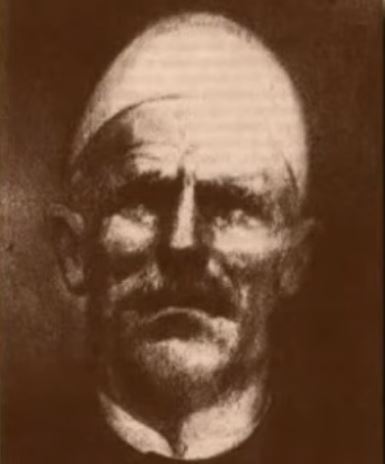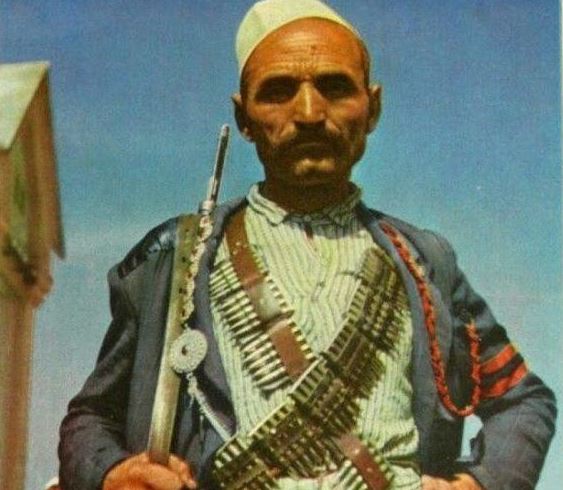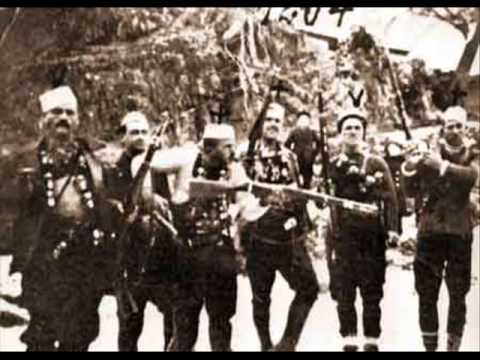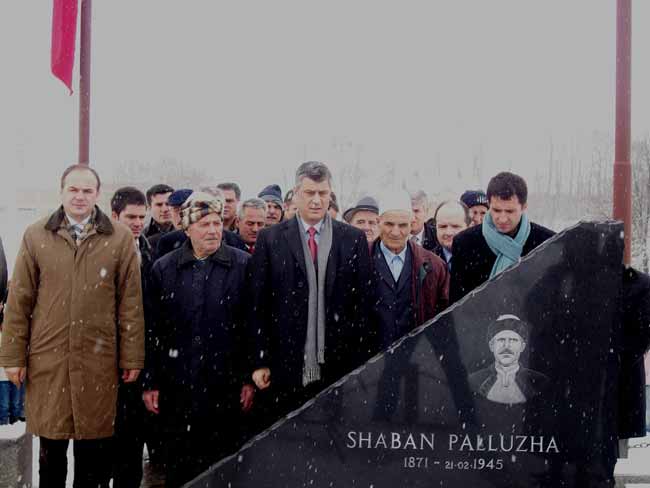|
|
Period:
Second World War
Region:
Kosovo and Metohia
The Albanian criminal Shaban Kastrati "Poluza" (1871-1945)
Shaban Kastrati (1871-1945) was an Albanian humbug, a brawler, a robber, a local bully, and a drunkard. His nickname was Shaban Poluža.
Although he experienced the Second World War in his later years, entering the eighth decade of his life, he accepted weapons and became a so-called officer at the Popular Front, that is, the “Balista”, a fascist unit that had the task of ethnically cleansing the territories of the Kingdom of Yugoslavia that were occupied by Albania in 1941 and annexed to the motherland.
Kastrati was the regional commander for the Metohija region and had his headquarters in Glogovac, 30 km west of Priština, ie in the central parts of Kosmet. He was also a member of the Central Committee of Bali Kombetar, where there were about 15 members chaired by Midhat Frasheri.

Shaban Kastrati was the leader of many atrocities, ie. genocide against Serbs and other non-Albanians in the area of Metohija, in places such as Peć, Prizren, Rahovec, Đakovica, Dečani, Suva Reka, and Istok.
His detachments were very cruel because they committed massacres, persecutions, arson, theft, rape, etc. They were simply dangerous groups that did not take over anything and did not have mercy even on children. They also persecuted the clergy of the Serbian Orthodox Church and looted and burned their property.
At the end of 1944, the NOVJ command sent about 40,000 soldiers to the region of Kosovo and Metohija intending to destroy the “Balista” Units, which was done after several months of fierce fighting. Shaban M. Kastrati died on February 21, 1945, in the vicinity of Glogovac in the central parts of Kosovo and Metohija.
The President of Albania, Dr. Sali Berisha decorated him in 1993, and Hashim Thaci, the so-called Prime Minister of Occupied Kosovo declared him a national hero in 2012.
|
ALBANIAN CRIMES AGAINST SERBS
|
| CRIMES |
Gorazdevac * March pogrom * April war * Kosovo's Spring * Plav end Gusinje
Radonjic's Lake * Pub Panda * Klecka * Mirovica's Marketplace * Bloody harvest
Bus of Livadice * Urosevac *
|
| CAMPS |
Likovac * Lapusnik * Kukesh * Yellow house * Plav * Balbaloc
|
| VICTIMS |
Branka Vasojevka * Baby of Grace * Danilo Milincic * Djordje Martinovic
Hariton Lukic * Shutakovic * Bosiljka Pasjanska * Srdjan Perovic
Ivan Bulatovic *
|
| CRIMINALS |
Ramush Haradinaj * Hasim Thaci * Adem Jashari * Agim Ramadani
Bedri Pejani * Shefket Verlaci * Midhat Frasheri * Mehmed Gradica
Skenderbeg Division * Prizren's League * Bali Kombetar * Agim Ceku
Rustem Mustafa * Kadri Veselji * Kujtim Berisha * Sulejman Selimi
Sali B. * Ibrahim Rugova * Enver Hodza * Redzep Majdani * Petro Koci
Ljuan Hajdraga * Mustafa Kruja
|
| PUBLICAT. |
Eyes of Patriarch * Empty house * Mother Ilaria * Abducation Kosovo
Dick Marty * Albanization Serbs * Without punishment *
|
CURRICULUM VITAE
Shaban M. Kastrati (Albanian: Shaban Kastrati) was born in July 1871 in the village of Godance, Glogovac municipality. At that time, it was part of the Ottoman Empire, and administratively it was under the Kosovo vilayet (province).
Shaban was the son of Rexhep Kastrati. He was an uneducated man with a very grumpy nature.
Since he was illiterate, he could not get a job as a state official. He had property and some land, but not enough to feed his family. So, from an early age, he learned the "craft" of humbug. He often went to the villages of Metohija with his group to plunder, stealing from Serbs (Christians) cattle, wood, hay, carts. He carried weapons with him to deal with Turkish gendarmes who wanted to arrest him.
He hated Serbs and considered them enemies to be fought by all means. He did not welcome the liberation of Kosovo and Metohija in October 1912 with enthusiasm, on the contrary. He was then a Turkish volunteer. After the Ottomans were expelled from the Balkans, he hid in the woods for a while or went to the Kingdom of Albania, like most of his compatriots.
During the First World War, he fought as an outlaw against Austria-Hungary and Bulgaria, because these were Christian countries that occupied the Kingdom of Serbia, ie the region of Kosovo and Metohija, in 1915-1918.
In 1921, he was elected deputy mayor of Drenica. In the mid-twenties, he often got into physical conflicts with Serbs who came from the western parts of Montenegro and eastern Herzegovina ... Yugoslav King Peter I Karadjordjević granted them the land as a reward for participating in the breakthrough of the Thessaloniki (Macedonian) Front.

Kastrati: "Wherever I find Serbs, I will kill them"
In September 1924, the gendarmerie command in Belgrade sent about 300 people with one artillery battery to deal with the Albanian criminal and executioner Azem Bejt. There were bloody clashes that lasted for several days in the zone of the Junički mountains. Shaban Poluža himself joined Bejta's detachments - Kachaks when he was wounded, and Bejta himself died at the Sadik Rama Tower from the wounds. There were over 120 dead Kachaks at that time, while Azem's wife took command of them.
Gendarme Raković arrested him in 1927 due to frequent fights and quarrels with the Serb population of the village of Polača. He managed to escape from prison when Hassan the Great bribed the commander of the gendarmerie station with 10 ducats. After that, Poluža went to Albania, from where he came to his homeland mostly to rob and burn the property of Serbs.
THE SECOND WORLD WAR
In April 1939, the Kingdom of Italy invaded Albania and occupied it, that is, placed it under its protectorate. Benito Mussolini wanted to attack the Kingdom of Yugoslavia through Albania, which was done two years later when Hitler also launched the Wehrmacht and Luftwaffe forces, and they were joined by Bulgarians, Hungarians, and Croats. The Yugoslav army capitulated due to great desertion and betrayal by Croats, Slovenes, and Muslims.
Under the Italian command, the Albanian divisions occupied parts of the Yugoslav kingdom: the whole of Metohija, the eastern part of Stari Ras, the surroundings of Skadar and Lake Ohrid, the Tetovo, and Debar regions, as well as most of Kosovo. The Italian fascist army was the supervisor in all operations.
Polačka Assembly
On April 9, 1941, just a day before Albania and Italy began attacks on the south-eastern parts of the Kingdom of Yugoslavia, a parliament was held in the house of Shaban Poluža in Polača, at which the so-called National movement and unity of Albanians was formed. About 50 representatives from all parts of Kosovo and Metohia were present. The parliament was opened by Poluža himself, who said that their compatriots should be helped in all possible forms, even with weapons.
Besides Shaban, other leaders of the so-called National movement were Myftar Barjaktari, Halil Hakija, Azem Aruci, Hazir Djeka, Rexhep Djeli, Mula Ibrahim, and Zuka Xani.
Criminal odyssey
One of the decisions of this assembly referred to the formation of a combat unit of 1,000 people. That formation was later called - Vulnetari. Their task was to ethnically clean the area of Kosovo and Metohija and Raška area from Serbs and to destroy all traces of their existence. That is how the genocidal mission was launched, in which first the priests and monks of the Serbian Orthodox Church came under attack, and then the Serbs and Jews.
In the first year of the war, Kastrati and his soldiers left their bloody traces in Novi Pazar, Plav, Gusinje, Rožaje, Ibarski Kolašin. About 1,000 Serbs were killed in just a few months, while thousands were expelled to occupied Serbia under Milan Nedić. The Germans called Shaban's atrocities "Bloody Wave".
Under his supervision, a concentration camp was established in Plav, in the northeast of Montenegro. Most women and children were brought to it, and over 500 Serbs were imprisoned.
At the beginning of 1942, Shaban Kastrati's detachments tried to break through to Podgorica, but they did not succeed but encountered fierce resistance from Serbian forces.

In November the same year, Shaban Kastrati joined the fascist organization "Bali Kombetar". The so-called The Popular Front was founded by Midhat Frasheri, an Albanian publicist and diplomat, while Shaban Kastrati was the regional commander and a member of the Central Committee in Tirana. He then had numerous detachments or about 500 men underarms. With them, Shaban Poluža continued his monstrous pogroms and attacks on everything that is Serbian and Orthodox.
Among other things, Shaban's soldiers staged the Uroševac massacre in 1943. It was only a few days after Italy capitulated and the Mussolini regime was overthrown. Wehrmacht officers then took control of the Ballists.
There are controversial stories that at that time, Shaban Poluža briefly tried to cooperate with the partisans, because he received a promise that Kosmet would join the motherland of Albania. However, this lasted for several months, so when he realized that he had been tricked, he came into conflict with them.
DEATH AND HERITAGE
At the end of 1944, the Supreme Command of the NOVJ sent about 40,000 soldiers to Kosovo and Metohija, who had the task of destroying the detachments of Bali Kombeter, as they numbered about 20,000 bandits. The partisan forces were commanded by General Petar Brajović, Commander of the 16th Corps, as well as Colonel Spasoje Đaković in front of special units.
Bloody clashes followed with heavy losses on both sides. That is how Shaban Poluža died on February 21, 1945, in the region of Terstenik, municipality of Glogovac, not far from his house. There is no reliable information on how he was killed. According to one version, he was killed by Yugoslav partisans under the command of Vuk Popović, and according to another, it happened in clashes between Albanian leaders.
Along with Shaban, his son was killed, as well as his comrade-in-arms Mehmet I. Gradica.
Albanian ballistics, ie. the fascists were destroyed in a special act of Tito's army and police 1946-1948, when they were all expelled through the Prokletije range to Albania. They were reconciled there for almost 15 years, and then they slowly returned to Kosmet, where they were the bearers of the wave of violence against Serbs and under the false pretext of "greater rights". The communist authorities in the province, as well as in Belgrade, looked through their fingers and made artificial peace, which escalated in 1981 into a great rebellion that could turn into war.
The President of the Republic of Albania, dr.Sali Berisha awarded Shaban Poluža, on June 3, 1993, the Order of Patriotic Activities of the First Order.
In the late 1990s, there was a new war between Serbs and Albanians, with the Albanians having great help from the West, so they succeeded in their intention to seize the southern Serbian province and declare independence in 2008.

"Chips don't fall far from the log"
By the decision of the occupation authorities in Priština on February 20, 2009, Shaban Poluža was rehabilitated and awarded the Order of the People's Hero. His grave was visited by the infamous criminal Hashim Thaci and his close associates (Kadri Veselji, etc.) because they considered him a hero of the new age, more precisely, they said that they ended the war that Poluža started.
In addition, a Memorial Academy was organized for him in Priština on the occasion of the 72nd anniversary of his death in 2017, and then the renovation of his house and the cave where he hid began, to turn it into a memorial museum.
Tags:
Please, vote for this article:
Visited: 3956 point
Number of votes: 697
|